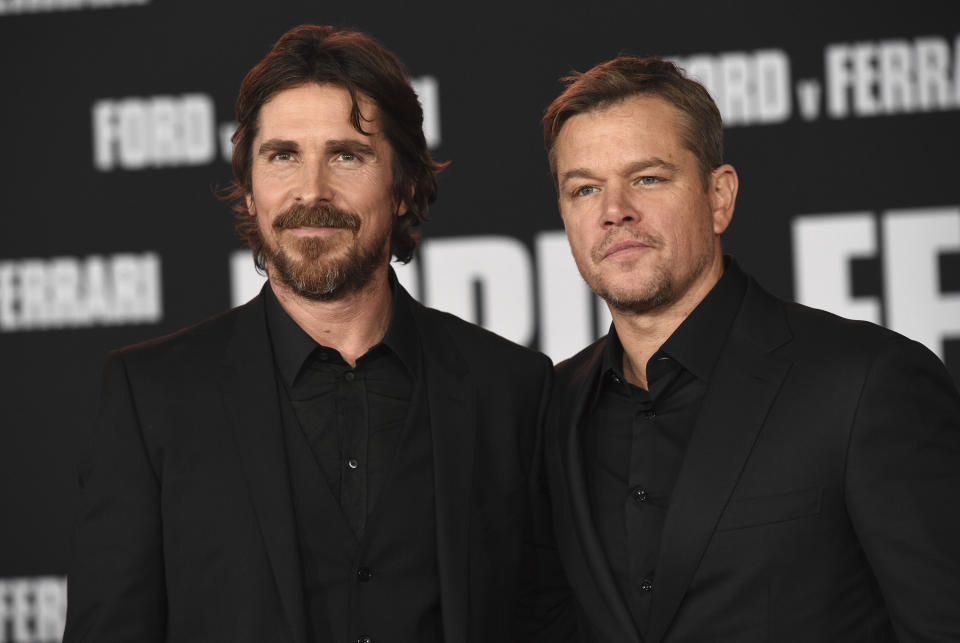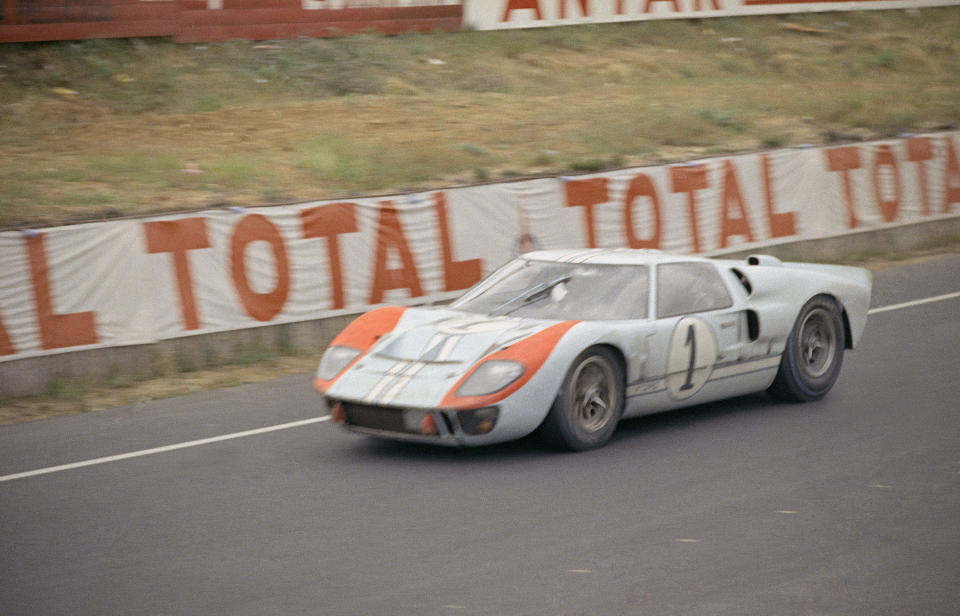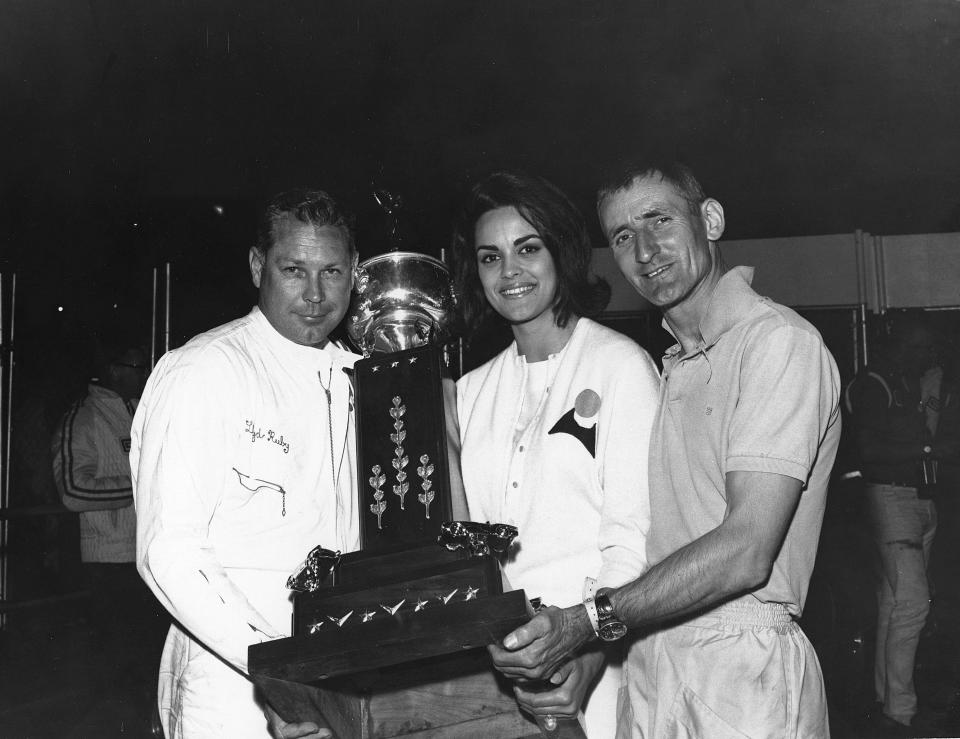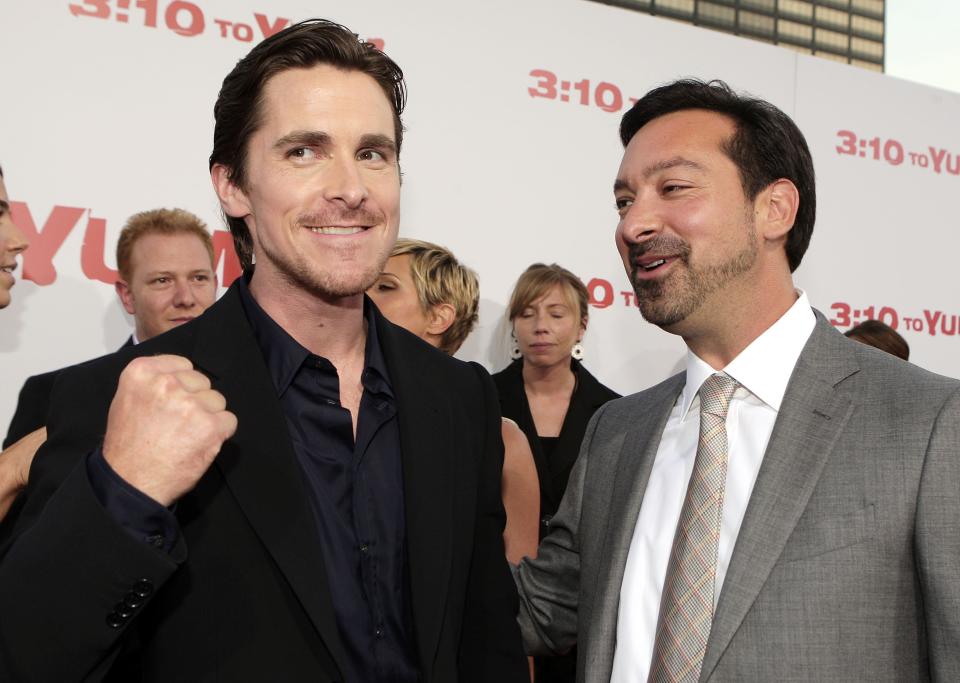'Le Mans '66' interview: Christian Bale tips Matt Damon for future directing career

Christian Bale thinks his Le Mans ‘66 co-star Matt Damon could be a great director one day, calling the Jason Bourne star a “multi-talented” filmmaker.
In the Oscar-winning racing drama (out now on digital and disc), Bale’s single-minded racing prodigy Ken Miles is recruited by Damon’s Ford automobile designer Carroll Shelby to work together on a race car to beat Ferrari at the legendary 24-hour Le Mans race challenge.
Talking in a new interview for James Mangold’s racing drama Batman star Bale compared his and Damon’s acting methods to the racing skills of the characters they play on screen.
“Matt [Damon] is a great actor. And he’s also got such a great understanding of the cameras, the lenses. He has a totally different approach to me. Probably a more comprehensive and intelligent approach. I think he’ll make a really good director at some point,” Bale says.

“Our approach to acting is sort of similar to the differences between our characters as well. Shelby is one hell of a racer, but is more strategic and understanding of the bigger picture, versus Miles, who’s just sort of doing his thing and often burning bridges and creating scorched earth because that’s the only way he knows how to do it.
“This acting thing is the only thing I know how to do, though many would argue that point, whereas Matt is multi-talented.”
Read more: Christian Bale joins Thor 4
Damon, best known as an actor in films like The Martian, Ocean’s Eleven and The Departed, is a screenwriter too, winning an Academy Award for the Good Will Hunting script he co-wrote with Ben Affleck. He’s a producer too, with credits on Manchester By The Sea, Jason Bourne and Promised Land. Bale, in contrast, has only ever acted on film and won an Oscar for The Fighter.
Read on to learn more about Christian Bale’s research methods for Le Mans ‘66, the dangerous stunts he drove himself, and his thoughts on why racing drivers make such fascinating subject matter.
Ken Miles is a fascinating character. What did you know about him going into Le Mans ‘66?
Christian Bale: I knew nothing about him, and I think I’m probably in the same boat as most people on that. He’s very much an unsung hero of motor-racing. He was a very English man, from the Midlands in Britain. Before racing, he was a military man, served in a tank unit. He was there, I think, D-Day plus two or three days after, then went across Europe. He was there when they liberated Belsen. Then he became an absolute, pure, racer’s racer, very strong-minded, incredibly passionate about what he did. Within the motor-racing circuit, you hear many stories about him, about that race in ’66, but they were all new to me.
Are you proud to finally bring his story out into the wider world?
Yes, but I also don’t think that this was a man who was doing it for the fame. I think that’s what made him so admired by the racers – that he did it just for that purity. He was inducted into the [racing] Hall of Fame already, and I think he would have been very happy being a man that the people in the racing world know who he is. So, I suspect that he felt that he got recognition. In my mind, I never would have viewed him as somebody who was longing for anything more.
Did your research for the movie give you a newfound respect for the limits and dangers these drivers pushed themselves to, back in the ‘60s?

Absolutely. And then there’s obviously the question of why. Why are they doing that? What kind of person is it who wants to do that? These guys were sitting on bombs. Literally, the doors in these cars were full of gas – the gas tanks were right there! That was a big burning danger. And back then, there were no real ambulance crews. There were many stories, horrendous stories, of people dying on the side of the road, from incidents that would be solved in 20 seconds nowadays. The safety just wasn’t there. And back then there was also an attitude of, ‘If you’re worried about safety, you shouldn’t be a racer.’
The huge difference nowadays is that pretty much any vehicle you get into, the strongest part of the car are the brakes. Whereas at that time, that wasn’t the case at all. These cars were rocket-ships going down the Mulsanne Straight on the Le Mans track at 230mph. Without good brakes! Not knowing if this bloody thing was going to stop! You know, it was, ‘Are the brakes going to overheat and just melt?’ The difference back then was the not knowing if they could stop, at the almost unfathomable speed of 230mph. That’s just mind-blowing.
Did you start to understand the psychology of these guys, over the course of making this?
Well, what you’ve got to do in portraying [a character like] that, is think about what kind of person chooses that. What kind of person thinks, ‘Yeah, I want to be in that car, doing that’? It’s not tricky to understand someone doing that when they are single and a young man. But when someone is a family man, when they’re a dad and a husband [like Ken Miles was], but they’re still doing that, that’s something that you really want to try and figure out. That’s a different kind of individual, someone searching for something beyond just the selfish and reckless. What are they pursuing there, you know?
What do you think Ken Miles is pursuing in this story?

In my amateur assessment, Ken is sort of reaching for the truth. The truth about himself. The dynamic and the very raw, mechanical man and machine – this purity that was in his life. It was both his Achilles heel and his saving grace. It’s what made him; what made him so absolutely brilliant, but also what made people very nervous of him, and generally stopped people from hiring him. Ken was always losing out to younger, better-looking men; but he spent his career looking at all these guys in his rear-view mirror in the actual races.
That [the importance of image and towing the corporate line] is all very much still in play today – in that juggernaut of business. Even more so now. It’s a massive industry, and they need to sell. I had some racers [over the course of my research] tell me, ‘Oh yeah, that’s still true. There are some brilliant racers out there who will never get the best gigs.’ Because, like Ken Miles, maybe they don’t have the best attitude, or might not look the part. And Ken had a wonderful friend in Carroll Shelby, who was prepared to put everything on the line for him. Shelby didn’t give a damn. He was like, ‘Ken is the best.’ And that was that.
What an amazing story theirs was. I just love the story. It gives me goosebumps just talking about it. And, also, the David vs Goliath element of it, this triumph of the misfits, having to deal with the Goliath of Ford, the Goliath of industry, the Goliath of beaurocracy and, of course, the Goliath of Ferrari, in terms of the respect and the speed and the reputation they were up against there – the intimidation of that. They couldn’t have done what they did without Ford, without its money, but they also did it in spite of them. It takes that. It takes this rebellious attitude, this pathfinder attitude – not a corporate attitude – to achieve true greatness. Being up against the absolute best. Being up against the absolute god of motor-racing, Enzo Ferrari. That’s what this was.
That relationship between Miles and Shelby, that perfect trust, is the cornerstone of the movie. How did you and Matt build that trust on screen together?

You know what, I’ve been doing this for, like, 30 years, and I’m still none the wiser. I’m really not! I don’t know how it’s done exactly. Sometimes it works, sometimes it doesn’t. Why it works sometimes and doesn’t others? I don’t really have an answer for you. Sometimes it just works and sometimes it doesn’t. And I feel that this time it did. Matt is a great actor. And he’s also got such a great understanding of the cameras, the lenses. He has a totally different approach to me. Probably a more comprehensive and intelligent approach. I think he’ll make a really good director at some point.
Our approach to acting is sort of similar to the differences between our characters as well. Shelby is one hell of a racer, but is more strategic and understanding of the bigger picture, versus Miles, who’s just sort of doing his thing and often burning bridges and creating scorched earth because that’s the only way he knows how to do it. This acting thing is the only thing I know how to do, though many would argue that point, whereas Matt is multi-talented.
A lot of the drivers you trained with for this movie, as well as the stunt co-ordinator, Robert Nagle, say you’re the best actor they’ve ever seen behind the wheel. That you’re a natural racer. Did you feel like you had something to prove to these guys on the track?
No, because I knew that if I felt that way then I would very quickly end up in the hay bales and wreck these cars! In fact, every day on set, I would say quietly to myself, ‘You’ve got nothing to prove to them. Don’t try and keep up. Don’t ever do it. It will never happen. You are here to pretend to know what you’re doing… And, just to be clear, you really don’t know what you’re doing!’ I managed to have a lot of fun, but did I ever feel like I was ever anything more than an absolute beginner? No.

Those guys are being incredibly generous with their comments about all of that. It was so much bloody fun, though. Some of that fun is on camera, a lot of it is off camera. And Nagle is fantastic. We’ve worked together before. I’ve hung off the side of a 1930s car, racing through Wisconsin, hanging on by a strap with him driving. I didn’t want a harness in case the car rolled – I wanted to be able to jump off. Nagle was at the wheel, flying through the middle of the night. It was brilliant. He is brilliant. To get to train with him was fantastic. And then there were the absolutely poignant moments of standing on the line with some of the sons of the original racers [from the actual ’66 Le Mans], like Alex Gurney and Derrick Hill, who were driving on this movie.
We’d be looking at photographs, going, ‘Oh, there’s your dad. And there’s your dad…’ And then we’d all get to reproduce that, to tear around Willow Springs in the Cobras, getting used to how they slide around. Oh man, I loved it to bits. It’s addictive out there. But to take it to their level is not something I’m going to kid myself that I can do. That would end in disaster! And they were twitchy as hell, you know, these cars, these toys that they built. You come around a bend and all of a sudden you are, as they say it, joining the 180 degrees club [spinning out].
How did it feel, joining the 180 degrees club?
Utterly exhilarating. Elation. For about a second. Because when I did that, I got the 180mph, but then started to over-correct and then went 360 degrees clockwise after that! I joined the 180mph Club and then the 360-degree Club in quick succession. It felt like I was doing a sort of Busby Berkeley, synchronised routine. But I had a constant smile on my face throughout all of it. It’s a strange brew of both a wonderful adrenalin rush and an almost hypnotic relaxation, because you’re thinking of nothing else other than what you’re doing. Your heartrate is going but you’re relaxed, too.
Was it tough to get back on the track for this, having had a motorbike accident in the past?
No, it felt totally different, being enclosed and strapped in and everything. And one of the great things they taught me for this was the donuts and sliding out. So, you get accustomed to that. What they taught me in particular that was crucial was this: ‘Don’t look where you’re going; look where you want to go.’ Which is actually very good advice in life. It sounds like a bit of a head-scratcher immediately. ‘What? Don’t look where you’re going? That sounds a bit bloody dangerous!’ But when you think about where you want to go, it makes complete sense. So, no, I didn’t have that [fear].
On one level, of course, this is a racing movie. But on another, its themes, of art vs commerce, gut instinct vs data, speak just as much to the movie industry. Was that a parallel that you guys spoke about?
Oh, completely. I think this is a transferrable story to every single industry. The more these wonderful opportunities present themselves, for me to work with people who are real masters of what they do, whether that’s in motor-racing or boxing or whatever the discipline, at that level it really does become therapy. Once you’ve gotten through the technical aspects of the discipline, it’s all a mind-game – as is everything in life. And it’s the same with the film industry. They are very relatable industries, in terms of seeing so many talented people who never seem to get a break. And the whole marketing machine; often that’s in complete opposition to what you’re trying to do in the work. This need for selling. I think that’s not only transferrable to just the film industry but also to life in general.

That’s what I hope people get from this film. It’s a tricky thing to pull people in, to put them inside of that machine, to get them to truly experience the bliss of pushing that machine to its limit. The holding it together, which is what those men did. But then, you have to make it relatable, and that’s what this movie is. While physically what these drivers are doing looks almost inhuman, inside they are the same: human, frail, with the same egos and issues that every single person deals with. When you appreciate that, then the race really starts to mean something to the spectator, beyond just a bunch of cars going at insane speeds. Then it becomes a meaningful race. And hopefully people will agree that we’ve managed to achieve that.”
Racing drivers tend to be mythical figures, don’t they? Almost impervious, superhuman; did it surprise you how relatable they are under all the kit?
Yeah, and it’s what I liked about Miles – that he wasn’t that character. Miles wasn’t this macho, tough guy who felt the need to exude that at all. He was very emotional about all of it. He gave us a great liberty [as filmmakers] because when you think of a very stoic racing driver, you think, ‘Well, how the hell can I get inside his head?’ But when you’ve got somebody like Miles, who had virtually no filter, we were able to express the love of racing through him. That’s essential. In real-life, Miles would say of motor-racing, ‘It’s not a wrestling match, it’s a ballet. It requires grace.’ There’s a great video I found of him [in real-life] talking to [American driver] Lloyd Ruby, who was a guy people described by saying he wouldn’t flinch if a mushroom cloud went off 10 feet away. Whereas Ken was spry and nimble and moving all the time and loved to talk. And [in this video], it’s Ken talking to Lloyd, saying [about the car], ‘Be gentle with her! Caress the machine! Don’t be a brute!’ And Lloyd’s looking at him with an attitude that’s like, ‘Oh, God, get this Englishman out of here!’ But Ken was really expressive in that way. And people were either really drawn to it or they just couldn’t be in the same room as him. And that’s a great character to be able to portray.

It’s something that the drivers told me, that this whole notion of ‘macho-ness’ – it’s going to hold people back. Because the level that these drivers are at, it’s such a delicate dance with the machine. For people who have not had the incredible pleasure to go around the track in a phenomenal car, they might feel that it’s just a matter of who can put their foot down the most and scream through it. Yes, there’s that to it. But to truly do it well, it’s a dance, like Ken says. Even the way you’re squeezing on with the gas, you’re sort of pointing your toe like a ballet dancer. You’re not slamming anything down. These machines are ridiculously responsive. So, you’ve got to feather everything, you’ve got to really feel it out. And it’s a wonderful dance that the finest manage beautifully. That quote, about it being a ballet not a fight, was a defining moment for me in understanding it all.”
James Mangold says he saw a lot of similarities between you and Ken Miles, specifically in that you love the work, but are “allergic” to all the bulls*** around it... Do you see some of yourself in Miles?

[Bursts out laughing] Jim and I have worked together before, and we’ve known each other for more than a decade… Look, I don’t ever try to compare myself with characters I play or think that way but, yeah, it happened fairly quickly. Jim went, ‘You do know it’s just you, right?’
As part of your research, you had lunch with Ken Miles’ son, Peter. What did you most want to learn from him?
You never know what you might learn. You just let the conversation flow and sometimes it can be going in the least likely direction and you get something really useful. I had certain questions, like, ‘Did he like to sing? Did he drive fast on the streets, or just on the track? Did he have a favourite author? Did he dance? How much did he drink?’ Basic things. It’s just about having the time to spend together with the people who knew the characters. Then they are reminded of occasions and stories that might seem incidental and meaningless to them but actually are really useful.
There were things I was scribbling down and Peter was like, ‘Really? That’s interesting to you?’ I was like, ‘That’s pivotal.’ So that was an enormous help. But, also, [when you’re playing a real-life character] you want to gain the trust of those who knew him and that means being thorough. You’re trying to tell someone’s story but in a short space of time. I think it’s honourable to meet with people when possible and I also want to hear what their questions are, too.
In some ways, this movie is about the quest for perfection. Have you ever achieved it?
Nowhere near it, no. But I’m not sure that achieving perfection is really the goal, even though it might feel like that’s the goal. I feel like if you try to achieve it, that’s more fun, isn’t it? That’s the challenge. You need a challenge in life that seems insurmountable, to keep yourself excited. And then, of course, there’s the question of, ‘What is perfection?’
It’s not like what I do is like a car race, when you know a bend and you can’t do that corner any better, it’s more abstract than that. I suspect perfection is totally unattainable, but that the trying is what brings us the quality in our lives.
Le Mans ‘66 is on Digital Download, 4k Ultra HD™, Blu-ray™, DVD & VOD now.

 Yahoo Movies
Yahoo Movies 
